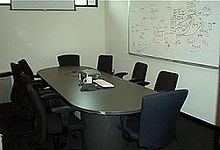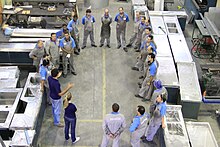|
MeetingA meeting is when two or more people come together to discuss one or more topics, often in a formal or business setting, but meetings also occur in a variety of other environments. Meetings can be used as form of group decision-making. DefinitionA meeting refers to a gathering with a specific agenda and not just mere gathering of people casually talking to each other.[1] Meetings may occur face-to-face or virtually, as mediated by communications technology, such as a telephone conference call, a skyped conference call or a videoconference. One Merriam-Webster dictionary defines a meeting as "an act or process of coming together" - for example "as [...] an assembly for a common purpose [...]".[2] Meeting planners and other meeting professionals may use the term "meeting" to denote an event booked at a hotel, convention center or any other venue dedicated to such gatherings.[1][3] Anthropologist Helen B. Schwartzman defines a meeting as "a communicative event involving three or more people who agree to assemble for a purpose ostensibly related to the functioning of an organization or group."[4] For her, meetings are characterized by "multiparty talk that is episodic in nature, and participants either develop or use specific conventions for regulating this talk."[4] Types   The term "meeting" may refer to a lecture (one presentation), seminar (typically several presentations, small audience, one day), conference (mid-size, one or more days), congress (large, several days), exhibition or trade show (with staffed stands being visited by passers-by), workshop (smaller, with active participants), training course, team-building session and kick-off event. Common types of meeting include:
Other varieties include breakfast meetings[7] off-site meetings (or Awayday meetings in the UK), and "stand-up meetings" where participants stand up to encourage brevity. Since a meeting can be held once or often, the meeting organizer has to determine the repetition and frequency of occurrence of the meeting: one-time, recurring meeting, or a series meeting such as a monthly "lunch and learn" event at a company, church, club or organization in which the placeholder is the same, but the agenda and topics to be covered vary.[citation needed] In Russian, a "flying meeting" (Russian: летучий митинг, romanized: letuchij miting) is a hastily called brief meeting.[8] Conversational analysisMeetings have been studied using conversation analysis. Meetings are thought of as a distinct speech exchange system with different norms and rules. Participants may move in and out of the conversation exchange system during the meeting. A meeting will often have a chair who has some control over the discussion in the meeting. The chair may have a superior position in a social hierarchy or be appointed as a facilitator.[9] The beginning of the meeting speech exchange system is often indicated by nonverbal cues, or stating the purpose of the meeting. In formal meetings, the chair has control over turn-taking in a conversation. In informal meetings the participants often decide for themselves who turn taking functions with the chair occasionally intervening. Non-verbal communication with the chair may be used to take a turn.[9] Often the chair will control the choice of topic of discussion, different chairs will control the conversation in different ways. A pre-closing formulation is an individual's summarization of the groups understanding of a topic. Silence is often used to indicate agreement to this final formalization. Turns within a topic are expected to be related to previous turns of the topic as a whole. In settings turns are long and more loosely related to the previous turns. In these cases, the speaker may introduce the subject matter of the turn and related it to the agenda topic. See also
References
Further readingLook up meeting in Wiktionary, the free dictionary. Wikimedia Commons has media related to Meetings.
|